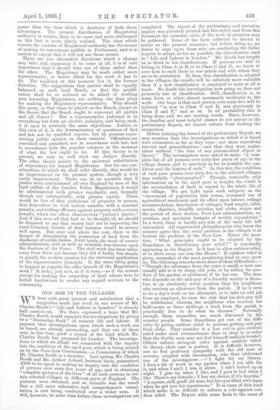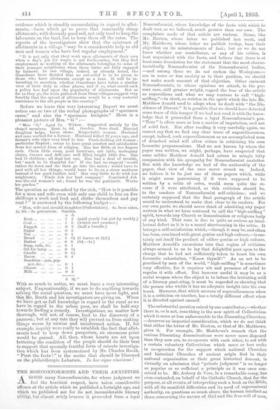OLD AGE IN THE VILLAGES.
WE hear with great interest and satisfaction that a suggestion made last week in our review of Mr. Charles Booth's "Life and Labour in London," is already half carried out. We there expressed a hope that Mr. Charles Booth would complete his investigations by giving us a "Doomsday-Book " of country life and labour. It appears that investigations upon which such a work can be based, are already proceeding, and that out of them i i may, n due time, grow a record of the kind which Mr. Charles Booth ham prepared for London. The investiga- tions to which we allude are connected with the inquiry into the condition of the aged poor, which is being carried on by the Poor-Law Commission,—a Commission of which Mr. Charles Booth is a member. Last spring, Mr. Charles Booth and Mr. Arthur Adana, between them, £100 to be spent in making an inquiry guaranteed u into the condition of persons over sixty-five years of age, and in obtaining complete pictures of the lives" of all such persons in cer- tain selected villages in different parts of England. The pictures were obtained, and so valuable was the result that a still more exhaustive and comprehensive exam nationis now being conducted over a wider area. It will, however, be some time before these investigations are completed. The report of the preliminary and tentative inquiry was privately printed last December, and from this document the immense value of the work in progress may be gathered. Some of the facts collected we intend to notice on the present occasion ; but before doing so, we desire to urge upon those who are conducting the fuller inquiry to adopt, as far as possible, the classification used in"Life and Labour in London." Mr. Booth has taught us to think in his classifications. If persons are said to belong to Class A or B, or to Class C and D, we know at once how to rank them in our minds and with whom they are to be correlated. If, then, this classification is adopted in the villages, the results will be infinitely more valuable than if a new classification is employed or none at all is made. No doubt the investigation now going on does not primarily aim at classification. Still, classification is, in some form or other, almost necessarily incidental to the work. Our hope is that each person over sixty-five will be ticketed "is now in Class C and D, was previously in Class E and F," and so on. In all probability this is being done, and we are wasting words. Since, however, the familiar and most helpful classes do not appear in the preliminary Report, we cannot refrain from making the suggestion. Before noticing the kernel of the preliminary Report, we may mention that the investigations on which it is based were exhaustive as far as they went—not mere superficial surveys and generalisations--and that they were under- taken without "the bias of any preconceived object or theory." The investigators were asked to make "a com- plete list of all persons over sixty-five years of age in the village chosen, and to ascertain as far as possible the con- dition and the history of each." In this way, the condition of each poor person over sixty-five in the selected villages was verbally "photographed." Though, nominally, only information as to the aged poor is sought, the result is the accumulation of facts in regard to the whole life of the village. We get light upon such subjects as the "movement of population into towns, increased use of agricultural machinery and its effect upon labour, cottage accommodation, description of cottages, food supply, allot- ments, charities, friendly societies and clubs, wages and the period of their decline, Poor-Law administration, re- creation, and specimen budgets of weekly expenditure." In a word, there is hardly any side of the rural life left untouched. All experienced philanthropists who know the country agree that the social problem in the villages is at bottom the problem of the Poor-Law. Hence the ques- tion, "What principles ought to be adopted by the Guardians in distributing poor relief ? " is repeatedly appearing in the Report. Is it best to allow outdoor relief, or to drive every one into the House ? If outdoor relief is given, anomalies of the most perplexing kind at once grow up. The following remarks show some of these difficulties :— "Though the allowance from the rates is small, a man can usually add to it by doing odd jobs, or by selling the pro- duce of his garden or allotment, if he has one. The man who depends on the sick-pay of a friendly society is there- fore in an absolutely worse position than his neighbour who receives an allowance from the parish. If he is seen to do a day's work on his allotment, or to take an odd job from an employer, he runs the risk that his sick-pay will be -withdrawn, whereas the neighbour who receives his half-crown or three shillings a week from the parish is practically free to do what he chooses." Naturally enough, these anomalies are much discussed by the country people. Some Guardians get out of the diffi- culty by giving outdoor relief to persons getting sick-pay from clubs. They consider it a less evil to give outdoor relief under such circumstances than to deny it, in order that the thrifty man may not feel himself unfairly treated. Others enforce stringent rules against outdoor relief. In theory, their case is perfect. It is difficult, however, not to feel profound sympathy with the old man of seventy, crippled with rheumatism, who thus addressed one of the investigators :—" I fight for my liberty. I does a bit of work in my garden when I am able for it, and when I ain't I lets it alone. I ain't locked up at night. I gets up when I like, and I goes to bed when I like. There's my victuals—I has my choice, if it's humble." "A square, stiff, gruff old man, but his eyes filled with tears when-he got into his experiences." It is cases of this kind which make it so difficult to enforce a rule against out- door relief, The Report adds some facts to the mass of evidence which is steadily accumulating in regard to allot- ments,—facts which go to prove that reasonably cheap allotments, with decently good soil, not only tend to keep the labourers on the land, but to keep them off the rates. The reports of the investigators show that the existence of allotments in a village "may be a considerable help to old men and women who have lost regular employment."
"It is not only that they work upon allotments of their own when a day's job for wages is not forthcoming, but they find employment in working at the allotments belonging to some of their younger neighbours when these latter are fully engaged by farmers. In one village, indeed, as already noted, the Guardians have decided that no out-relief is to be given to those who have allotments except as a loan. It will be in- teresting to ascertain whether Guardians have taken a similar view of their duty in other places, and if so, what result such a policy has bad upon the popularity of allotments. But so far as they go, the facts gathered from these villages suggest very forcibly that the spread of allotments would be a very material assistance to the old people in the country."
Before we leave this very interesting Report we must notice one or two of the verbal photographs of "specimen cases," and also the "specimen budgets." Here is a pleasant picture of Mrs. " G " :— "Mrs. G.' Aged 74. Widow. Supported mainly by the chapel members. Rent ls. Gd. Garden. Sons dead. Married daughter helps. Lives alone. Respectable woman. Husband and sons worked for a farmer. Husband killed 22 years ago, and farmer's wife since very kind to her. Fresh-looking old woman ; particular Baptist ; seems to have great comfort and satisfaction from her special form of religion. Has her Bible at her fingers ends. Clean little room, good furniture, oak table, mahogany chairs, dresser and delf-case well filled, bright little fire. Has had 11 children ; all dead but one. Has had a deal of trouble, but 'much to be thankful for.' If she had no support would rather lie down and die than go into the union ; would have to part with all her things ; would have to lie on a straw mattress instead of her good feather bed.' Has very little to do with her
neighbours. Finds Job her best company.' Concluded Job was the old woman's cat ; found he was the patriarch. Works her garden."
The question so often asked by the rich, "How is it possible for a man and wife even with only one child to live on five shillings a week and feed and clothe themselves and pay rent ?" is answered by the following budget :— " Man, wife and invalid daughter (Oxfordshire). 4s. from rates, Is. 6d.-3s. precarious. Garden.
a. d.
1 2 (paid yearly but put by weekly.) Coal 1 2 (winter and summer.)
Faggot 0 3 (half a bundle.)
Sugar ... 0 2 O 5 1 O (5 loaves at 21d.) O 8 (8d.-1s.) O 1 0 1
o
4 5 9i"
With so much to notice, we must leave a very interesting subject. Unquestionably, if we are to do anything towards solving the social question, we must have mere light, and this Mr. Booth and his investigators are giving us. When we have got as full knowledge in regard to the rural as we have in regard to the urban poor, we shall be half-way towards finding a remedy. Investigations, no matter how thorough, will not, of course, lead to the discovery of a panacea ; but at any rate they will prevent us from making things worse by unwise and uninformed action. If, for example, inquiry were really to establish the fact that allot- ments tend to keep down pauperism, an enormous point would be gained. All, then, whose hearts are set upon bettering the condition of the people should do their best to support that specially fruitful form of minute investiga- tion which has been systematised by Mr. Charles Booth. "First the facts !" is the motto that should be blazoned on the philanthropic Labarum. in hoc signo vincimus !
Bread ... Butter Soap, soda, &c. Oil for lamp Candle 0 Bacon ... 0 Sundries—jam, pep- per, &a... 0 I Cheese ... ... 0 1 Milk ... 0 2



































 Previous page
Previous page